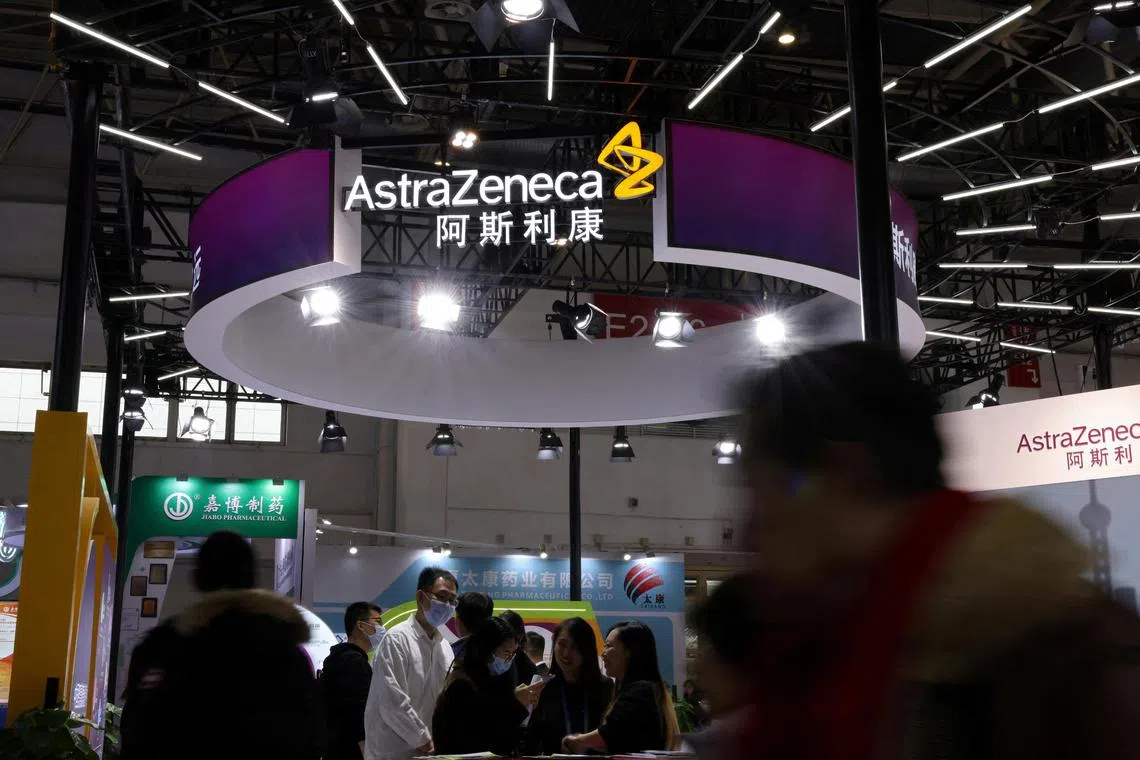China detains AstraZeneca staff in data, drug import probes
Sign up now: Get insights on Asia's fast-moving developments

The individuals being held are all Chinese citizens who marketed cancer drugs in AstraZeneca’s oncology division.
PHOTO: REUTERS
BEIJING – Police in China have detained five current and former employees of British drugmaker AstraZeneca for questioning about potential illegal activities, according to people familiar with the matter.
The individuals being held are all Chinese citizens who marketed cancer drugs in AstraZeneca’s oncology division, the people said, asking not to be identified discussing private information.
The investigation is being led by police in the southern metropolis of Shenzhen, and the detentions took place earlier in the summer, the people said.
One probe is related to the company’s collection of patient data, and whether that infringed China’s data-privacy laws, according to the people.
The authorities are also looking into some of the individuals’ involvement in importing a liver cancer drug that has not been approved for distribution in mainland China, one of the people said.
“We are aware a small number of our employees in China are under investigation, and we have no further information to share at this point,” AstraZeneca said in a statement to a Bloomberg News query.
Shenzhen police did not immediately respond to a request for comment
The investigations are a potential setback for the global pharmaceutical giant, which is deeply entrenched in China.
AstraZeneca executives have publicly expressed their confidence in the Chinese market, even as heightened geopolitical tensions have caused other multinational companies to take a more cautious view on the world’s second-largest economy.
The UK-based drugmaker was previously taken to task by the Chinese authorities in 2022 for allegedly tampering with the gene-testing results of cancer patients to make treatment eligible for reimbursement by China’s state-run medical insurance.
AstraZeneca said at the time that it had taken disciplinary action against some employees.
Some foreign companies have become concerned about the safety of their employees in China, and the risks of being caught up in government probes where little information is forthcoming from the authorities.
Chinese police have been known to hold people for questioning lasting months or even years.
In 2023, five local employees of US due diligence firm Mintz Group were detained and its Beijing office was raided by police. The firm was later fined
In a separate case, three employees of British advertising company WPP were arrested in China as part of a bribery investigation.
China has also detained individuals who work for foreign companies for suspected espionage activities.
New data laws
Beijing recently implemented new laws on data security and personal information protection that require companies to keep most of the data they have gathered in China within the country.
Some multinational companies have fretted about running afoul of those laws, which could result in fines and other penalties.
The investigation into AstraZeneca’s sales practices comes amid an ongoing crackdown on drug smuggling in China.
While Beijing has launched regulatory reforms over the years to speed up reviews of life-saving medicines, some new therapies are either still not available in China or approved much later than in other developed nations.
That has forced patients to find drugs from outside China, sometimes through illegal channels.
While China allows patients to seek therapies it has not approved from other jurisdictions, it is illegal to bring unauthorised medicines into China for sale.
It is unclear if AstraZeneca employees facilitated the import of the yet-to-be approved liver cancer drug called Imjudo into the country.
In July, regulators in the southern Chinese province of Guangdong busted a drug smuggling ring, seizing 200 million yuan (S$36.7 million) worth of medicines for treating diseases such as cancer and diabetes, local media outlet Jiemian reported in August.
AstraZeneca has been in China since 1993, and reported US$5.9 billion (S$7.7 billion) in revenue from the country in 2023, more than 10 per cent of the group’s total.
It has global supply sites in Wuxi, Taizhou and Qingdao, and sells drugs and therapies in China that treat cancers, respiratory ailments, cardiovascular diseases and other conditions.
The drugmaker has committed more than US$1 billion for two new factories in the country since 2023.
It has also partnered with a local biotechnology company to join the global race to develop weight-loss medicines and acquired another Chinese firm for cell therapies.
In August, Mr Leon Wang, AstraZeneca’s China president, told an audience of global chief executives and government officials gathered in the coastal city of Qingdao that the company firmly believes in Chinese manufacturing as an indispensable part of the global supply chain, and Chinese innovation’s potential to jump ahead and lead the industry.
AstraZeneca, Mr Wang added, aims to become a multinational company that combines innovation from both China and the West, according to a post on AstraZeneca’s official WeChat account. BLOOMBERG


